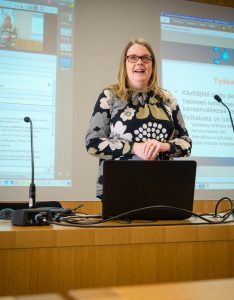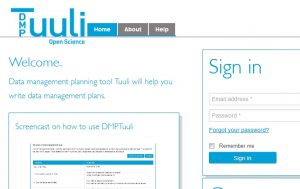Project Mildred puts the University of Helsinki research data policy in practice by providing researchers with the tools to carry out proper data management. Project Mildred 2016–2017 will be completed this spring, although the work related to the data infrastructure building will continue (see the University of Helsinki’s digitalization programme). It is time to look at what’s been done and what will be done. Here’s a quick summary of the current situation of the five Mildred sub-projects.
Mildred 1 – The beta version for Research Data Services is in use
Research Data Services gathers University of Helsinki’s existing data services onto one online service channel. The beta version of the service channel, carried out in Project Mildred’s Sub-project 1, is already in use, though not completed.
The beta version lacks descriptions regarding data sharing and security – these will be added soon. The service descriptions related to data management planning, data publishing and data citing are ready and can be found in the service channel. The service channel also includes Wizard, which guides the user to find services. The service channel is advertised to researchers in doctoral schools.
Mildred 2 – Solutions for data storing and sharing to be presented
In the autumn, Mildred’s Sub-project 2 piloted the EUDAT’s B2DROP service for data storing and sharing. The results of the pilot are currently under review, and issues related to data storing, sharing and publishing (regarding data set interfaces) are on the table. In addition, the University of Helsinki’s own data repository service for sensitive data is being prepared.
Sub-project 2 has suffered from a shortage of resources along the way, particularly because of the co-determination talks at the University of Helsinki in 2016. Therefore it won’t reach the goals set out at the beginning. However, the project will be brought to the point where the solutions for data storing and sharing are ready to be deployed. What happens then depends on the decisions made in the University of Helsinki’s digitalization programme.
Mildred 3 – Research Data website to be released in spring 2018
A new version of the ThinkOpen’s Research Data website is planned to be released by the end of April 2018. Then more research data of the University of Helsinki’s researchers can be found on the ThinkOpen site. The site for data publishing makes use of ThinkOpen and the results of the user interface design carried out in Mildred’s Sub-project 3. In the first phase, the metadata is harvested from three sources (Etsin, Zenodo, B2Share/EUDAT).
Tools for harvesting and processing metadata were developed in the ATTX2016 project. At the turn of the year, the ATTX developers moved to CSC – IT Center for Science, and therefore the ATTX development work is now purchased from CSC. The Helsinki University Library carries out the analysis of the metadata of the test data. ThinkOpen’s Research Data website is implemented jointly by the University of Helsinki’s Communications and Community Relations and the University of Helsinki’s framework supplier Druid.
Mildred 4 – More capacity for data storing and data backup is coming
Mildred’s Sub-project 4 builds capacity for research data storage and backup. In the autumn, two tasks were on the agenda: preparations for the purchases for the Ceph cluster (for data storing) and the research data backup service. At the moment, the purchases are being made. The end result will be more storage and backup capacity for the researchers and research groups at the University of Helsinki. Mildred 4 is behind schedule due to a resource shortage, but it will achieve the goals set in the beginning when the purchases are completed.
Mildred 5 – DMP guidance has been updated, and updates are to be continued
The biggest achievement for Mildred’s Sub-project 5 was to improve general guidance for data management planning (DMP) at the University of Helsinki. The guidance and a new glossary can be found in DMPTuuli and the Wiki of the University of Helsinki (see the guidance and the glossary). M5 has also developed discipline-specific DMP guidance, in co-operation with researchers at the University of Helsinki. Several improvements for DMPTuuli were made before the Academy of Finland’s September 2017 call: clarification of the guidance, DMP guidance for historians, and DMP guidance for researchers in the fields of art, design and architecture.
Requirements for DMPs are in a state of change, and tools and services are constantly being developed. The guidance also must be updated frequently. This means that the work done in Mildred 5 will continue – the plan for the continuous maintenance of DMP guidance was made in the autumn. Currently, the University of Helsinki is a part of a national working group that develops the guidance for sensitive data (with regard to General Data Protection Regulation, GDPR). The guidance is due to be completed in March or April.
In the context of Project Mildred, Mildred 5 has reached the objectives set, and the final report has been approved. The Helsinki University Library (Data team) and University of Helsinki Data Support will continue the work regarding the DMP guidance.
…and finally, here’s a video loop about Mildred the basil (planted 28th of September):


